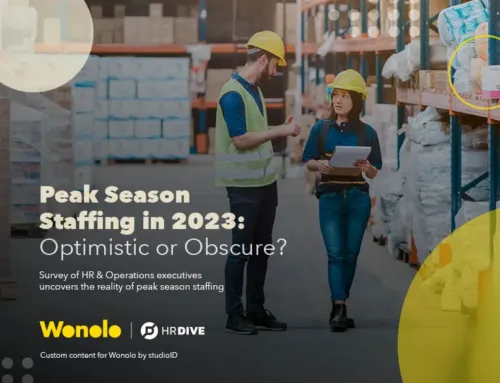Wonolo
This is the second in a series of articles we’ll be running, pitting Wonolo against other staffing solutions in a head-to-head comparison. In this post, we’ll take a look at how Shiftgig’s features compare to Wonolo’s and dive into Shiftgig reviews to find out what users have to say about the platform. But first, let’s take a look at Shiftgig, how it works, pay rates, and other details about the platform.
What is Shiftgig?
Shiftgig aims to provide a streamlined way for businesses to connect with hourly workers through its mobile marketplace. Shiftgig workers are called “Specialists,” and they’re screened before they’re able to claim shifts through the platform. In other words, Shiftgig makes it possible for workers to secure temporary jobs while providing a vetted candidate pool for companies in the food service, hospitality, retail, and experiential marketing industries.
What Does Shiftgig Pay, and How Do Payments Work?
When candidates sign up as a Specialist with Shiftgig, they fill out a Pay Selection Form to choose whether they’d prefer to be paid through direct deposit or pay card. Specialists are paid weekly, on Fridays, based on hours worked, reported, and verified by the client for the previous week (Sunday through Saturday). 
Eligible Shiftgig specialists can opt for DailyPay, which allows early access to pay before payday. Currently, DailyPay is only available to eligible Specialists in New York and Chicago, and it’s not available for ShiftgigX shifts. Once a Specialists enrolls in DailyPay, they build up a daily balance with each shift worked, but only after the hours are confirmed with the shift supervisor, which can take up to 72 hours. A small fee applies for each transaction if you want to withdraw your earnings before payday with DailyPay.
What about the pay rates? Shiftgig offers job opportunities for servers, bartenders, cooks, customer service and call center jobs, brand ambassadors, and others, so the specifiic rate of pay may vary based on the position and the company, as well as the worker’s prior experience. We took a look at Glassdoor and Indeed to find out what kind of pay a Shiftgig user might expect for various roles. According to Glassdoor, a “Specialist” earns an average of about $11.31 per hour. Because all Shiftgig users are called “Specialists,” we can assume that this role covers most positions you might find through the platform. Glassdoor has some more specific data on hourly rates based on user-submitted pay information:
- Server: $11.61 per hour
- Cook: $11.33 per hour
- Server/Bartender: $11.75 per hour
- Event Specialist: $13.00 per hour
- Warehouse Worker: $9.00 – $10.00 per hour
Indeed has some data on pay for similar roles:
- Bartender: $12.11 per hour
- Banquet Server: $10.88 per hour
- Event Staff: $13.00 to $14.00 per hour
- Line Cook/Prep Cook: $11.64 per hour
- Server: $11.07 per hour
- Event Specialist: $14.01 per hour
- Retail Sales Associate: $19.58 per hour
- Customer Service Representative: $10.57 per hour
According to Indeed, “Average Shiftgig hourly pay ranges from approximately $10.00 per hour for Cashier to $25.00 per hour for Promotional Model.” Keep in mind that the figures listed above are based on user-submitted pay rates (sometimes based on just a few reports) and aren’t necessarily representative of the overall averages workers earn.
How Does Shiftgig Work?
To get started with Shiftgig, a prospective worker fills out an application on Shiftgig’s website. A company representative then generally reaches out to the candidate to arrange an in-person interview and orientation. Once a worker is signed up and approved, they can begin to browse through the available jobs on the platform – either through the “Jobs” section on Shiftgig’s website or on a Shiftgig mobile app. Results can be filtered by keyword and location.
Filtered results are displayed with a brief description of each available job and a map on the right-hand side of the screen to show the specific location of a position. Users click on an available job for more information or to apply. After you’re accepted for a job, Shiftgig will send push notifications to remind you when your shift starts and remind you to submit your hours following your shift, at which time you also have the opportunity to submit feedback regarding your experience. To get paid on time, users must submit their hours within 24 hours after ending a shift.
Is Shiftgig Legit? How Are the Reviews?
Shiftgig is a legit company, and many people find temporary work through the platform. However, it’s not all rainbows and unicorns, according to reviews. We looked at Shiftgig reviews on Indeed, Glassdoor, and on the company’s Facebook page to find out what users think of the platform. Some reviewers say the pay is too low, and wish there were more shifts available, noting that work can be infrequent at times, particularly during slow seasons. (Jobs for event staffers, for instance, are more prevalent during wedding season, while there are more jobs in retail during the busy holiday shopping season.)
We read several complaints about the availability of Shiftgig’s customer service and human resources teams. Reviewers say that it’s difficult to get in touch with someone from Shiftgig if you need to discuss a problem or have a question. A few reviewers also cite receiving conflicting information on policies and procedures. For example, one reviewer says that during the interview process, it was explained that if a company cancels a shift before the worker reports to the job (usually because the extra help is no longer needed), the worker would still be paid for the shift. Once that actually happened, however, they were told that this rule doesn’t apply if the employer notifies the worker ahead of time. There are some other complaints surrounding payment issues and a lack of communication. Additionally, one reviewer at Indeed says Shiftgig hires many new workers regularly, which means that the available jobs often get snatched up quickly, a scenario that some reviewers find unfair to long-term, loyal Shiftgig users who have built up a solid reputation.
Wonolo vs. Shiftgig: Comparing Features
Want to know how Wonolo stacks up to Shiftgig? Let’s take a look at some of the key differences.
- Pay Schedules – Wonolo pays its workers (Wonoloers) daily, issuing payments the day after a job is complete and the employer rates the Wonoloer’s performance. Shiftgig issues weekly payments, with a DailyPay option available only to workers in New York and Chicago, and not for all types of jobs.
- Interviewing and Onboarding – Once you apply to work through Shiftgig, a company representative will contact you to arrange an in-person interview. At Wonolo, we conduct all screening and vetting via phone, meaning you don’t need to take time out to travel to an in-person interview. That means you’ll be up and running – and ready to start accepting jobs – faster.
- Pay Rates – A common gripe among Shiftgig reviewers is that they wish the pay was higher. At Wonolo, companies decide how much to pay their temporary workers, and the service fee is added to the company’s invoice after shifts are complete – not taken out of workers’ pay. (We’re not entirely clear on how this is handled at Shiftgig.) Based on common pay rates observed for completed jobs through Wonolo in the San Francisco Bay area, Wonoloers can earn between $10 and $16 per hour for warehousing/order fulfillment jobs, between $15 and $35 per hour for delivery jobs, between $15 and $25 per hour for clerical and data entry jobs, between $15 and $25 for general labor/moving jobs, and between $13 and $30 per hour for brand ambassador and event staffing jobs.
- Promotions and Recognition – At Wonolo, workers have opportunities to prove themselves through temporary assignments with a variety of companies – earning achievement badges for demonstrating continued excellence in fulfillment and warehousing, delivery, administrative, and events jobs, as well as bonuses for excellent work with certain companies and job types. Badge recipients earn not only recognition for their exceptional work, but also recognition rewards, from bonus cash to t-shirts and more.
- Upward Mobility – Some Wonoloers are offered full-time employment with companies they work for after proving themselves through temporary jobs. According to Shiftgig’s user agreement, “Other than connecting with users for the purpose of receiving or providing a position in the service industry, individuals and companies are prohibited from using the Site and Services for the purpose of recruiting for another website or soliciting, advertising to, or contacting users for employment, contracting, or any other purpose for a business not affiliated with Shiftgig without the express written consent of Shiftgig.” One reviewer says that Shiftgig workers aren’t permitted to work for any companies on a full-time basis after working with the same company through Shiftgig, although another reviewer says there are some opportunities for full-time jobs.
- Technology – Shiftgig displays available jobs to users based on keyword and location filtering. Wonolo relies on AI technology to provide data-driven staffing through ratings, a two-way feedback loop with companies offering feedback on Wonoloers and vice-versa, allowing us to quickly weed out poor performers and reward top talent. By building a massive data set, we’ve learned what factors are crucial for successful job performance and leverage those insights to predict job ratings and adjust results to reduce things like no-shows, maximize fill rates, and generally make the entire platform run like a well-oiled machine. In our customer portal, we call this the Fill Advisor. It takes several factors into consideration to estimate how likely the job is to be filled, allowing customers to make adjustments that increase the odds that their jobs will be filled quickly. The result? Happy workers and happy clients.
In the coming weeks, we’ll be looking at other staffing solutions to see how Wonolo stacks up to competitors so that you can make smarter choices when it comes to meeting your staffing needs or landing jobs.
![]()


![[Report] Beyond the Gig: Exploring Reliable Work Options for the Modern Workforce](https://info.wonolo.com/wp-content/uploads/2023/10/Worker-Preferences-Report-Header-Image-500x383.png)



